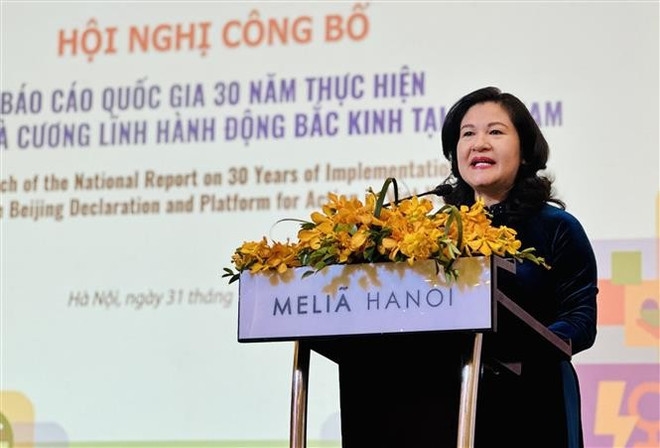The National Report on 30 Years of Implementation of the Beijing Declaration and Platform for Action in Vietnam reveals that the widespread implementation of the Beijing framework, adopted at the Fourth World Conference on Women in Beijing in 1995, has been a crucial factor in creating positive improvements in gender equality, contributing to the nation's development journey.
    |
 |
|
Deputy Minister of Home Affairs Nguyen Thi Ha addresses the conference. |
It notes that the most outstanding among measures for promoting gender equality in Vietnam, which is also a remarkable achievement in the implementation of the Beijing Declaration and Platform over the last five years, is that the country has issued and widely carried out the national strategy for gender equality for 2021-2030.
The report highlights that Vietnam always sees gender equality as the foundation of social progress and sustainable development, with the principle of leaving no one behind incorporated in all development strategies, laws, and programs.
According to Deputy Minister of Home Affairs Nguyen Thi Ha, Vietnam’s experience shows economic growth must go hand in hand with social progress and justice, women and children should be placed at the heart of development policies, the state management system enhanced, and gender mainstreamed in all aspects and at all levels.
She said the report is not only a record of achievements but also Vietnam’s strong commitment to gender equality and women empowerment in the new phase.
Caroline Nyamayemombe, Country Representative of U.N. Women in Vietnam, noted that no countries in the world have achieved full gender equality yet. As the global community enters the final phase toward 2030, Vietnam stands among those nations demonstrating a forward-looking vision on gender equality.
She reiterated U.N. Women’s pledge to continue partnering with the Ministry of Home Affairs as well as competent ministries, mass organizations, and development partners to translate Vietnam’s strong political commitments into tangible benefits for women and girls in every locality, every community, and every family.
The report underscores Vietnam’s steady progress in advancing gender equality. Over the past two decades, the country has been among the fastest to narrow the gender gap and was an early achiever of the Millennium Development Goal on gender equality.
Last year, Vietnam ranked 72nd out of 146 countries in the Global Gender Gap Report, up 11 places from 2022. Women now hold 30.26% of National Assembly seats, among the highest in the Asia - Pacific region, make up 46.8% of the workforce, and own 28.2% of enterprises, while gender disparities in basic education have largely narrowed down. Healthcare access for ethnic minority and migrant women has improved, and support services for victims of gender-based violence have expanded considerably.
In April 2024, Vietnam was elected to the Executive Board of U.N. Women for the 2025-2027 term.
However, gender stereotypes, rapid population aging, and the impacts of climate change and disease outbreaks continue to pose challenges and affect women and children more heavily, requiring the whole political system’s sustained determination, strategic and creative measures, and extensive international cooperation, heard the conference.
Source: VNA